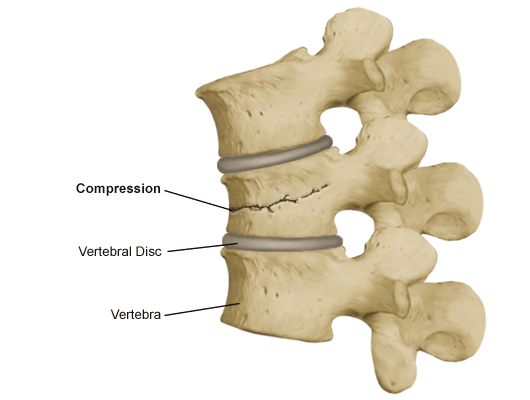A vertebral compression fracture involves the collapse of one or more of the spinal vertebral segments. Vertebral compression fractures are most commonly the result of trauma or chronic bone weakening (as seen with conditions such as Osteoporosis, Cancer or infection). Typically older individuals suffer the highest rates of vertebral compression fractures meaning if you’re over 60years of age and suffer back or spinal related pain it is important to consult with your family physician or an allied health practitioner such as a Chiropractor for appropriate assessment.
With ageing, bones can become weakened with even minor events triggering vertebral collapse. Everyday tasks such as bending, lifting, coughing and sneezing can contribute to micro-trauma which can permanently alter the strength and shape of the spine. Vertebral compression fractures are characterized by a loss of height as anterior wedging of the spine causes the ‘stooped posture.’ Unfortunately majority of injuries are not diagnosed as sufferers merely consider their spinal pain to be age or arthritis related.
Major Vertebral Compression Fracture Risk Factors
- People with bone weakening diseases such as Osteoporosis and Osteopenia
- People with previous personal history of cancer or current cancer/tumors that have spread to spinal structures
- Individuals with a long history of smoking, poor diet and corticosteroid usage
- Gender (women), particular those who went through early menopause
Treatment
While many vertebral compression fractures remain untreated, there are various steps you can take to reduce the incidence, manage spinal pain or prevent occurrence.
- Physical therapy to enhance movement, posture and flexibility
- Exercise rehabilitation to strength postural stability
- Back braces to reduce associated spinal pain and provide additional support if necessary
- Surgery: available options include balloon kyphoplasty, vertebroplasty and spinal fusion. If these options are indicated for your individual situation it is important to approach your post-surgery rehabilitation in the appropriate manner to improve healing and recovery times


Recent Comments